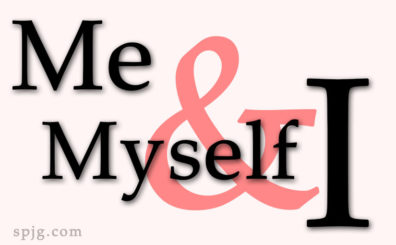
Does good grammar matter?
Anti-virus software is invisible when it’s working well. Or it would be, except that Norton keeps creating pop-up notices telling me how many intrusion attempts it’s blocked lately.
Similarly, good text is self-effacing. Books don’t have annoying pop-up notices telling you how many errors were edited out. You only realize how important it is to achieve correctness, consistency, and clarity when someone hasn’t.
What’s the effect of bad grammar?
In this post when I talk about “grammar”, I’m talking about grammar but also related rule-based skills like spelling and punctuation. Word choice is another kettle of fish—or can of worms, as the case may be.
If I’m reading a book and I encounter a sentence that is so awful that I have to stop and read it two or three times to get the idea, I ask myself: Who edited this? Did anybody edit it? How can this be?!
If I’m asking these questions, I’m not thinking about the story or the learning objective. And I’m not happy. From the perspective of the author, that is Not Good.
Am I making a mountain out of a molehill?
Look, I understand that, by definition, many people don’t know or care about the spellings of commonly confused words. In everyday text messages and Facebook posts, awkward sentences abound because life’s too short for everyone to properly locate their modifiers, use the specific pronoun that goes with the antecedent, or even capitalize names. Correctness is missing but not missed.
Among experts there are disagreements about what constitutes correctness—about the use of the Oxford comma, whether to space out, hyphenate, or close up expressions like “copyeditor”, and whether the idiom about the comb describes it as “fine-tooth” or “fine-toothed”, for example.
But every decent copyeditor would agree that you don’t let the author refer to the person second-in-command of a bank as “Vice Principle Johnson”, and that if the author writes “these shirts costs too much” then the sentence needs work.
Are you stabbing people in the eyeballs?
I read a lot. Until I moved to Asia, nearly all the books I read had been created by what one might call the Anglophone Publishing Establishment, which produces polished works edited by experienced professional copyeditors who go over manuscripts with the proverbial fine-tooth(ed) comb. As an undergraduate student of linguistics, I spent countless hours analyzing the structure of English sentences. Upon graduation, I spent several years working for a hundred-year-old publishing house and trained as a copyeditor. After moving to Asia, I spent a year editing English-language news articles written by Chinese people and several years at an education company where I wrote hundreds of pages of English grammar exercises for children. In short, my brain has been trained both implicitly and explicitly to discriminate between good English and bad.
If I’m reading something that has not been written well, errors jump out and stab me in the eyeballs, and I have to correct them in my head before moving on. If there are several errors on every page, then I’m not reading the text, I’m gritting my teeth and bracing for the next error.
Maybe your mom and your bff won’t be bothered by half the stuff that I am, but what about publishing professionals? Do you want the editor or agent who sees your so-called ‘final draft’ to think “Oh dear, this still needs a lot of clean-up work”, or do you want them to think “Ah, good stuff, this is basically ready to go”?
Why not, you know, learn the craft?
Many authors operate on the assumption that their written grammar doesn’t have to be particularly good, since what matters most is the imaginative or factual content of their work. They believe any mistakes can and will be cleaned up by somebody else in the final stages before publication.
Well. Okay. Yes and no.
Yes, editing can wait. If you are writing a draft, obsessing over details will slow you down, or perhaps prevent you from ever finishing your draft, and of course time spent polishing a particular paragraph is wasted if later you cut that whole section or chapter. It’s too early to aim for correctness.
And yes, maybe it’s enough if the publisher hires a copyeditor to do an edit immediately before publication to catch the sneaky typos and to make the text conform to a particular set of “house style” rules that only the publisher knows or cares about. That’s consistency, and it’s arbitrary.
On the other hand… how clear is your prose?
I get that you want to focus on the ideas in your draft, but the WHAT of your draft is intimately bound up with the HOW. Your ideas shine through when your writing is clear. Badly-structured sentences can slow readers down, give them the wrong idea, or cause them to stop reading altogether. Correctness and consistency can (arguably) be delegated to an expert, but the responsibility for clarity belongs to the author.
Bad writing can ruin good ideas. Your credibility is in your own hands. Do you know what good writing should look and sound like, or do you not?
Conclusion
Yes, good grammar matters. But you knew I was going to say that.
Take a moment to appreciate copyeditors.
Nobody’s job is easy, and with few exceptions, everybody’s job contributes to making our lives more livable. Copyeditors are among the unsung heroes.
Get better at writing.
I’d like to share a quote from Firefly, though it’s not my favourite. And not even grammatically correct.
Captain Sash: Catalyzer is a nothin’ part, Captain.
Captain Reynolds: It’s nothin’ ’til you don’t got one. Then it appears to be everything.
In other words, good grammar goes unnoticed and bad grammar leaves you stranded at the corner of ‘no’ and ‘where’.
Words are the tools of the craft of writing; we should respect them and practice with them until we are experts.
I already am an expert, and I’m here to help.
*Edit 2023-06-15: I originally wrote this based on my experience as a participant in the Singapore Writers’ Group, a group of fiction writers. Now I have a job in the publishing industry again, and what I wrote seems to be just as true for authors of science papers as for fiction authors.



